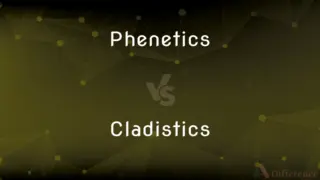Chinches vs. Bedbug — What's the Difference?
Edited by Tayyaba Rehman — By Urooj Arif — Updated on April 23, 2024
Chinches refer to a broader category of bugs including bedbugs, while the term 'bedbug' specifically describes insects that feed on human blood and infest sleeping areas.

Difference Between Chinches and Bedbug
Table of Contents
ADVERTISEMENT
Key Differences
Chinches is a Spanish term broadly used to describe various small bugs, including bedbugs, but also extends to other similar insects that might not be parasitic. On the other hand, bedbugs specifically belong to the genus Cimex, and primarily include species like Cimex lectularius, known for their parasitic relationship with humans, living in mattresses and furniture.
While chinches might be used in some contexts to refer to insects affecting plants or animals, bedbugs are notorious for their impact on human environments, thriving in bedrooms and living spaces where people sleep. This focus on human blood as their sole food source differentiates bedbugs distinctly from other bugs often labeled as chinches.
Additionally, the term chinches can sometimes refer to pests found in agricultural or wild settings, not necessarily associated with human habitats. Conversely, bedbugs are almost exclusively found in close association with human dwellings, relying on human blood for survival and thus are rarely seen in non-domestic environments.
In terms of control and eradication, people dealing with chinches might need to identify the specific type of bug to address the infestation appropriately, as the term can include a variety of insects. Bedbugs, however, require specific extermination strategies that target their unique hiding spots and nocturnal lifestyle.
Understanding the distinction can also affect pest control methods; treatments that are effective for bedbugs might not be suitable for other types of chinches, emphasizing the importance of accurate identification in pest management.
ADVERTISEMENT
Comparison Chart
Definition
Broad term for various small insects.
Insects specifically feeding on human blood.
Habitat
Varied, including plants and animals.
Human homes, especially bedrooms.
Relation to Humans
May not directly impact humans.
Directly parasitic, living in close proximity to humans.
Common Species
Various, depending on region.
Primarily Cimex lectularius.
Pest Control Requirements
Depends on the specific type.
Specific strategies targeting hiding spots and lifestyle.
Compare with Definitions
Chinches
Small, often pestiferous insects broadly categorized under chinches.
Farmers often deal with different types of chinches harming their crops.
Bedbug
A nocturnal insect that feeds exclusively on blood.
The hotel had to close temporarily to manage a severe bedbug infestation.
Chinches
Sometimes refers to any small annoying bug.
Chinches were swarming around the picnic area, bothering everyone.
Bedbug
Causes discomfort and sleep disturbances.
Bedbug bites can cause severe itching and loss of sleep.
Chinches
Can include non-parasitic bugs affecting plants.
Chinches can be a major problem in agricultural settings.
Bedbug
Has experienced a resurgence in many urban areas.
Urban areas are seeing an increase in bedbug outbreaks due to high population density and mobility.
Chinches
In some regions, synonymous with nuisance pests.
Getting rid of chinches in the garden has been a tough job.
Bedbug
Commonly found in mattresses and sleeping areas.
Check your hotel beds for signs of bedbugs to avoid bringing them home.
Chinches
Broad usage in Spanish-speaking countries.
In Mexico, chinches are often discussed in household pest control conversations.
Bedbug
Difficult to eradicate without professional help.
We had to hire a professional exterminator to deal with our bedbug problem.
Chinches
See bedbug.
Bedbug
Any of several small wingless parasitic insects of the family Cimicidae, especially Cimex lectularius, which infests dwellings and bedding and feeds on human blood. Also called regionally chinch.
Chinches
Plural of chinch
Bedbug
A small nocturnal insect (Cimex lectularius), of the family Cimicidae, that feeds on the blood of humans and other warm-blooded hosts.
Bedbug
A wingless, bloodsucking, hemipterous insect (Cimex Lectularius), sometimes infesting houses and especially beds. See Illustration in Appendix.
Bedbug
Bug of temperate regions that infests especially beds and feeds on human blood
Common Curiosities
How do bedbugs affect humans?
Bedbugs live in close association with humans, feeding on their blood and potentially causing allergic reactions and sleep disturbances.
How do chinches affect humans?
Depending on the type, chinches may affect humans indirectly through damage to plants or animals or may not impact them at all.
What are bedbugs?
Bedbugs are small, nocturnal insects that feed exclusively on human blood and are often found in sleeping areas.
Where are chinches found?
Chinches can be found in a variety of environments, including outdoors in agriculture or in homes, depending on the species.
Do all chinches bite?
Not all chinches bite; many types affect plants or animals and do not interact directly with humans.
What are chinches?
Chinches broadly refer to various small insects, often pests, and can include many different species.
How can one prevent a bedbug infestation?
Prevention includes regular inspection of sleeping areas, maintaining cleanliness, and being cautious when staying in hotels or buying used furniture.
Can chinches and bedbugs be the same?
In some contexts, chinches may include bedbugs, but not all chinches are bedbugs.
Where do bedbugs typically live?
Bedbugs are typically found in mattresses, furniture, and anywhere close to where people sleep.
What are common signs of a bedbug infestation?
Signs include small blood stains on bedding, sightings of the bugs themselves, and clusters of itchy bites.
What treatments work for bedbugs?
Effective treatments often include heat treatments, chemical insecticides, and thorough cleaning and vacuuming of affected areas.
Can bedbugs transmit diseases?
Despite their blood-feeding habits, bedbugs are not known to transmit diseases to humans.
Are bedbugs easy to get rid of?
Bedbugs are notoriously difficult to eliminate, often requiring professional extermination services.
What treatments work for chinches?
Treatment depends on the type of chinches; some may require insecticides, while others might be managed through environmental changes.
Can chinches transmit diseases?
Generally, chinches do not transmit diseases to humans, though the specific impact can vary based on the type of bug.
Share Your Discovery

Previous Comparison
Antipasto vs. Antipasti
Next Comparison
Relief vs. CameoAuthor Spotlight
Written by
Urooj ArifUrooj is a skilled content writer at Ask Difference, known for her exceptional ability to simplify complex topics into engaging and informative content. With a passion for research and a flair for clear, concise writing, she consistently delivers articles that resonate with our diverse audience.
Edited by
Tayyaba RehmanTayyaba Rehman is a distinguished writer, currently serving as a primary contributor to askdifference.com. As a researcher in semantics and etymology, Tayyaba's passion for the complexity of languages and their distinctions has found a perfect home on the platform. Tayyaba delves into the intricacies of language, distinguishing between commonly confused words and phrases, thereby providing clarity for readers worldwide.















































